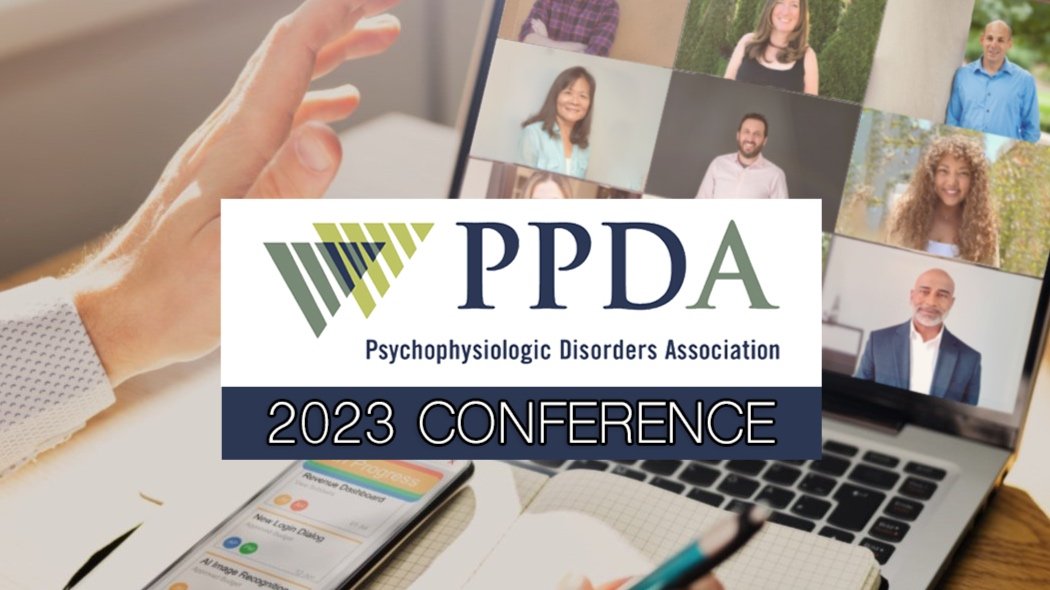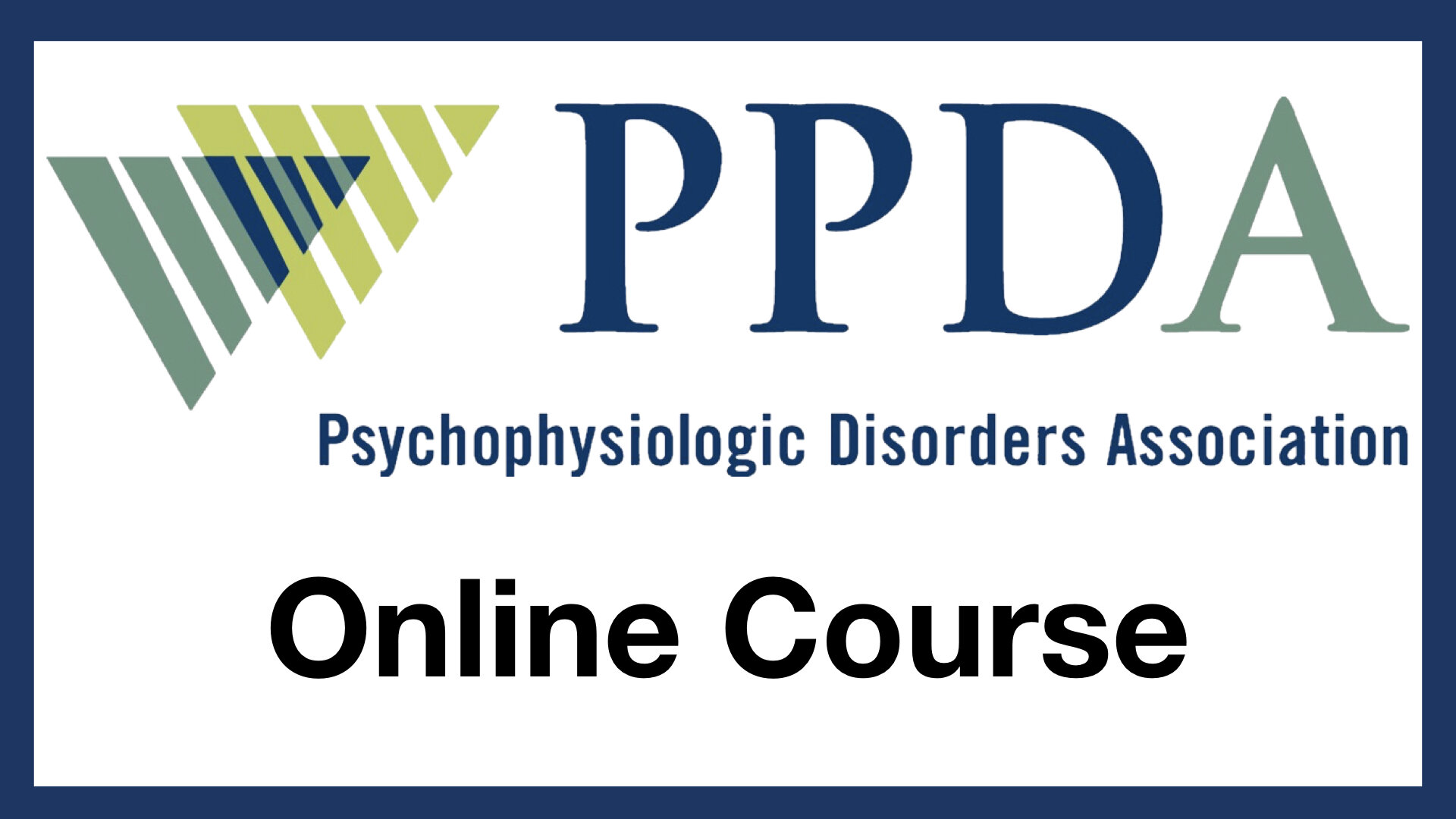Mission
Awareness. Education. Diagnosis. Treatment.
The Psychophysiologic Disorders Association is a 501(c)(3) nonprofit with a mission to end the chronic pain epidemic and opioid crisis by advancing the awareness, diagnosis and treatment of neuroplastic symptoms that affect millions worldwide.
These real, physical symptoms (generated in the brain) include chronic pain, migraine, fibromyalgia, irritable bowel syndrome, chronic fatigue, pelvic pain, and other chronic or medically unexplained symptoms and are collectively referred to as Psychophysiologic Disorders. Watch this video to learn more!
Educating health professionals around the world is necessary to increase the number of practitioners who can diagnose and treat PPD. Education is also a key component of the recovery process, helping patients understand how the brain can learn and unlearn chronic pain or other symptoms.
Our evidence-based, biopsychosocial approach is safer, more affordable, and more effective than the usual (outdated) treatments recommended for chronic pain, chronic functional syndromes and medically unexplained symptoms.
With our focus on uncovering sources of stress, trauma and unrecognized emotion, patients are able to relieve and even CURE their symptoms without drugs, surgery, physical therapy or expensive alternative treatments.
Thus, our work is a vital step toward ending the chronic pain epidemic and opioid crisis.
Impact
Largest Mind-Body Conference in History
The 2021 PPDA Conference attracted over 400 attendees from around the world, featured 23 expert speakers, and received rave reviews. The recording is still available.
The 2023 PPDA Conference
The recorded 2023 PPDA Conference is available for a 30% Discount for PPDA Members. Learn how to eliminate chronic pain, migraine, fibromyalgia, irritable bowel syndrome, chronic fatigue, non-structural pelvic pain, eczema, and other chronic or medically unexplained symptoms through an evidence-based, biopsychosocial approach. Learn more and register!
Clinical Research
Thanks to many of our donors in 2017, we were able to sponsor the first randomized controlled trial showing that chronic back pain can not only be managed, but can be CURED using a mindbody approach. And the study was published in JAMA Psychiatry, one of the top medical journals!
PPDA Co-Founders Alan Gordon and Dr. Howard Schubiner along with Dr. Yoni Ashar, Christie Uipi and Dr. Tor Wager led the study at the University of Colorado Boulder. The study used fMRI (functional magnetic resonance imaging) to see the participants’ brains before and after treatment, showing that the brain can “unlearn” pain. The results were amazing!
Of 151 total participants, 33 of 50 participants (66%) randomized to PRT were pain-free or nearly pain-free at posttreatment (reporting a pain intensity score of 0 or 1 of 10), compared with 10 of 51 participants (20%) randomized to placebo and 5 of 50 participants (10%) randomized to usual care. Treatment effects were maintained at 1-year follow-up.
Ashar YK, Gordon A, Schubiner H, et al. Effect of Pain Reprocessing Therapy vs Placebo and Usual Care for Patients With Chronic Back Pain: A Randomized Clinical Trial. JAMA Psychiatry. Published online September 29, 2021. doi:10.1001/jamapsychiatry.2021.2669
It’s incredibly exciting and challenging to put our ideas into a real-world clinic, and this wouldn’t have happened without the support of PPDA donors who helped us to sponsor the clinical trial (above).
Chronic Pain Documentary
PAIN BRAIN is a feature documentary that explores the new understanding of chronic pain that will provide hope to millions who suffer.
As an Executive Producer, PPDA President David Clarke MD led the effort to crowdfund this compelling look at the University of Colorado (Boulder) clinical trial (see above). Scenes of the new Pain Relief Psychotherapy being used with individual patients provide insightful detail about how this research achieved its groundbreaking results.
Directed and Edited by Mitch Dickman, Tim Kaminski & Laurie Polisky.
You can buy or rent the film here.
Online Course
We created an online course for health professionals who want to learn how to better diagnose and treat mindbody disorders. Led by PPDA President Dr. David Clarke and Executive Director Jessica Shahinian, the course utilizes multiple real-world case studies to challenge participants to conduct a stress evaluation, treat the patient on the basis of empathy, and be able to eliminate (not just manage) chronic pain, chronic functional syndromes and medically unexplained symptoms! This course is engaging and easy to understand, making it a valuable recovery resource for patients. Learn more and register!
PSYCHOPHYSIOLOGIC DISORDERS
From this innovative book, medical and mental health professionals will learn to relieve (not just manage) physical symptoms by assessing for and treating current life stresses, past traumas, suppressed emotions and the prolonged impact of adverse childhood experiences (ACEs). The sixteen authors from five countries are among the most experienced (averaging 20 years) PPD clinicians in the world. They are also remarkably diverse, practicing in the fields of Adolescent Medicine, Family Medicine, Gastroenterology, Health Journalism, Integrative Medicine, Internal Medicine, Movement Therapy, Neuroscience, Orthopedic Spine Surgery, Pain Medicine, Physiotherapy, Psychiatry, Psychoanalysis, Psychology, Psychotherapy, and Sports Medicine. From this wide range of backgrounds, the authors reached consensus on a core set of practices that were a revelation for them and their patients. These concepts are practical and can readily be implemented by any healthcare professional. Buy on Amazon.
A Diagnostic Guide for Psychophysiologic Disorders
Our second PPD textbook will complement our 2019 textbook. PPD patients can present with a variety of symptoms. Unfortunately, they are usually labeled with one or more of hundreds of diagnoses that don’t fully explain the cause of their symptoms or support the best treatment approach. Our new book will assist healthcare professionals by briefly describing the role of PPD in each of hundreds of conditions that can cause chronic pain, chronic functional syndromes and medically unexplained symptoms.
Did you know that one in six adults and 40% of primary care patients suffer from medically unexplained symptoms, chronic functional syndromes, or psychosocial factors responsible for chronic pain? Collectively these are called Psychophysiologic Disorders or PPD. As recent research has confirmed, a trauma-informed approach to diagnosis and treatment can transform these patients from among the most frustrating to the most rewarding and give them a far better chance for a full recovery. This process was described in detail in the previous volume from the PPD Association titled Psychophysiologic Disorders (KDP Publishing, 2019).
A key barrier to implementing this approach is that most medical clinicians lack formal training in assessing for PPD and most mental health professionals lack knowledge of medical diagnoses. This book addresses that blind spot with a table of hundreds of medical diagnoses that are common in PPD patients. The table explains each diagnosis and describes the contribution from PPD without jargon or technical terms. It is based on published evidence and the authors’ experience diagnosing and treating PPD in thousands of patients.
Also included is an introduction to the diagnostic process for PPD that includes the authors’ most recent recommendations. There is also a detailed self-assessment questionnaire for patients that is designed to provide insight into how well their condition fits the biopsychosocial context commonly associated with PPD. As in the companion book Psychophysiologic Disorders, the concepts are practical and can readily be implemented by any healthcare professional.
Learning this approach is more than just clinically effective. As one family physician who learned these concepts said: “It put the joy back into my practice.” Buy on Amazon.
500K+
Dollars Raised
We have raised over $500,000 to help achieve our mission of advancing the diagnosis and treatment of stress-induced medical conditions.
100K+
People Impacted
Our team has reached over 100,000 people around the world in spreading awareness about mindbody disorders (PPD) and the safest, most affordable, and most effective way to treat and even cure patients with these conditions.
14
Years educatinG Globally
Founded in 2009 and incorporated in 2011, the PPDA has spent the last 14 years educating health professionals and the public on mindbody disorders (PPD) and the most effective way to diagnose and treat these conditions that were once thought to be incurable.
Board of Directors
Our Board of Directors is a highly accomplished, multi-disciplinary team of volunteer clinicians, researchers and patient advocates from across the United States.
David Clarke, MD
Gastroenterology
Board-certified in Gastroenterology and Internal Medicine. Clinical Assistant Professor of Gastroenterology Emeritus at Oregon Health & Science University. Author/Editor of three books, producer of three films, lectures internationally and has done over 100 TV/Radio interviews.
Rob Munger, MA, MS
Patient Advocate
Created the TMS Wiki, the largest source of PPD information for the public, after recovering from years of repetitive strain injury (RSI). Teaching Fellow at Harvard University Extension School & Summer School, specializing in Health Economics and decision-making.
Howard Schubiner, MD
Internal Medicine & Pediatrics
Director of the Mind Body Medicine Program at Providence Hospital in Southfield, Michigan. Clinical Professor at Michigan State University. Authored over 100 publications in scientific journals and books and lectures globally.
David Schechter, MD
Family & Sports Medicine
Board-certified Family Medicine & Sports Medicine physician who specializes in a non-surgical approach to pain and injury. Formerly a Clinical Associate Professor in the Department of Family Medicine at USC. Named a Top Doctor for over ten years.
Dan Ratner, PsyD
Psychologist
A former mind body symptom sufferer himself – in the form of eight years of seemingly chronicback pain – Dr. Ratner is an experienced psychologist specializing in the treatment of mind body
sufferers.
Lee Canter, MSW
Patient Advocate
Clinical social worker turned highly successful entrepreneur whose teacher training companies reached over 1MM people. Recovered from over seven years of migraine symptoms and committed to helping other sufferers of chronic pain.
Lynn Crothers, LCMHCA
Psychotherapist
Therapist based in Western North Carolina.A former chronic migraine sufferer, Lynn spent decades living with undiagnosed—or wrongly diagnosed—neurological symptoms. Her life changed when she discovered the mind-body work of Alan Gordon, Dr. John Stracks, and the PPDA.
Rebecca Kennedy, MD
Family Medicine
Board certified family medicine physician with a lifelong interest in the mind-body connection. Previously the lead of the long COVID clinic for Kaiser Permanente Northwest. Now exclusively treats mind-body conditions at her clinic Resilience Health Care in Portland, Oregon
Staff
Marketing Director | Luke Jones
Luke is an accomplished digital marketer, known for his ability to create and implement effective marketing strategies, streamline processes, and boost lead generation using data analysis and innovative approaches. He has established and managed successful marketing agencies, consistently delivering excellent results and garnering hundreds of thousands of followers for his clients. As a specialist in comprehensive marketing strategies, Luke is skilled at aligning marketing efforts with organizational objectives to drive success.
Operations Manager | Rena Le
With a background in administration, healthcare, and customer service, Rena is an accomplished operations manager with a track record of success. Her experience in overseeing daily operations in high-volume, fast-paced environments has honed her skills in managing complex schedules, coordinating logistics, and organizing events. Rena is highly skilled in providing excellent customer service and excels in leading teams, training new employees, and providing comprehensive support. Her talent for problem-solving, troubleshooting, and attention to detail has allowed her to prioritize time-sensitive tasks, minimize turnaround times, and maximize efficiency.

















